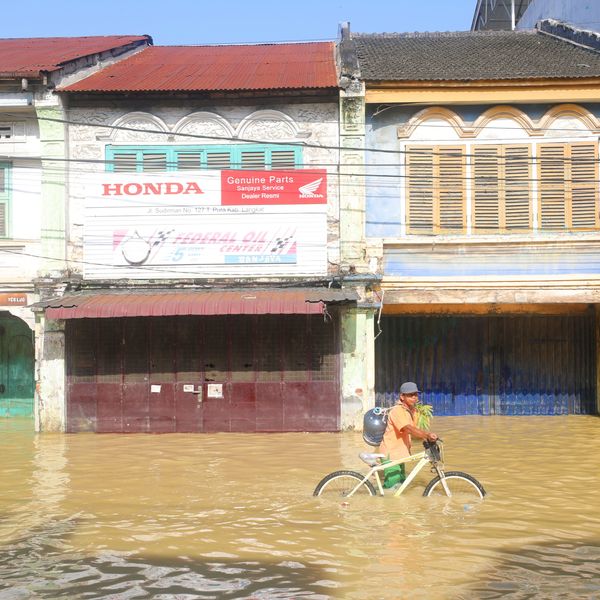As residents in Vanuatu returned home to start the immense task of cleaning up and rebuilding in the wake of "monster" Cyclone Pam, the island nation's president on Monday blamed climate change for the damage wreaked by the powerful storm.
"This is a very devastating cyclone," President Baldwin Lonsdale told the United Nations's third World Conference on Disaster Risk Reduction in Sendai, Japan. "I term it a monster that has hit Vanuatu."
He said the extreme weather that the tiny nation of 267,000 people, who are spread over 65 islands in the South Pacific, had experienced was directly linked to climate change: "We see the level of sea rise...The cyclone seasons, the warm, the rain, all this is affected. This year we have more than in any year...Yes, climate change is contributing to this."
"There will be a time when the waters will not recede."
--Anote Tong, president of Kiribati
As of early Monday morning, six people were confirmed dead and 90 percent of homes reported to have been "seriously damaged" due to the catastrophic Category 5 storm which descended Friday night and lasted into Saturday--but those numbers came only from the country's capital of Port Vila. Aid workers, who first reached the country on Sunday, said it will take weeks to account for the storm's devastation, and that the final death toll will likely be much higher.
Oxfam country director in Port Vila, Colin Collet van Rooyen, said Sunday that the cyclone "is likely to be one of the worst disasters ever seen in the Pacific. Entire communities have been blown away."
Little information has trickled in from vulnerable outer islands that are home to tens of thousands.
"These islands have much less infrastructure than the capital of Port Vila and are extremely remote and hard to reach in the best of times," said Oxfam's executive director Helen Szoke in a statement on Sunday. "We hold grave fears for the people on these outer and remote islands."
She added: "It's becoming increasingly clear that we are now dealing with worse than the worst case scenario in Vanuatu."
At the UN conference, President Lonsdale's statements were echoed by Anote Tong, president of nearby Kiribati, also affected by the storm.
"For leaders of low-lying island atolls, the hazards of global warming affect our people in different ways, and it is a catastrophe that impinges on our rights...and our survival into the future," he reportedly said in a speech on Sunday. "There will be a time when the waters will not recede."
World Bank Group vice president and special envoy for climate change Rachel Kyte agreed with the island presidents.
"It is indisputable that part of the Pacific Ocean is much warmer today than in previous years, so these storms are intensifying," Kyte told Agence France-Presse in an interview at the UN disaster risk conference. "It's hugely ironic that this storm should hit Vanuatu while we are all here. If we truly care for those people, we have to respond," she said, referring to the need for environmental commitments.
Activists have warned of global warming's impact on the Pacific Islands for years. Last fall, 350.org's Pacific Climate Warriors took their message to the seas, sitting atop traditional outrigger canoes, kayaks, and other small boats as they declared: "We are not willing to drown because of climate change."
As Marshall Islands president Christopher Loeak said in an impassioned video plea last year, island communities like his and Vanuatu are "at the frontline in the battle against climate change."
At the time, Loeak called on world leaders to take strong action against global warming, both on their own and as part of international climate negotiations taking place at the COP21 talks in Paris this December.
"[T]o avoid the worst impacts of a warmer world, this new deal must capture a vision for a carbon-free world by the middle of the century," he said, referring to a the global climate policy to be adopted in Paris this year. "Without it, no seawall will be high enough to save my country."


